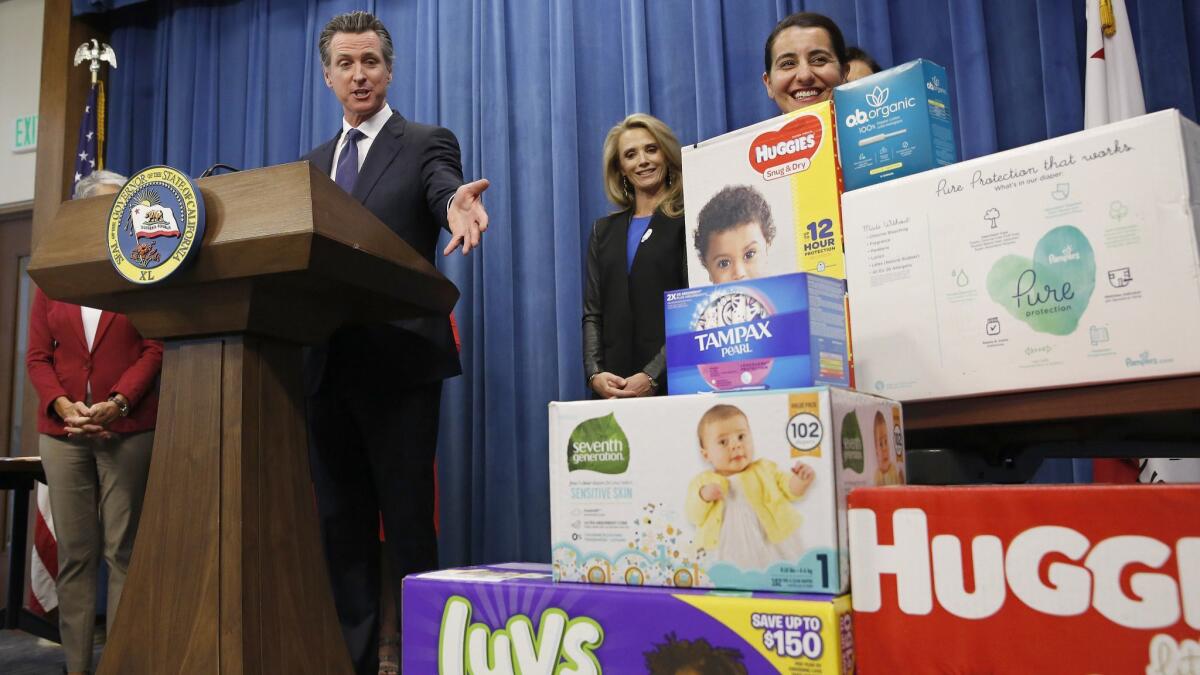Editorial: Diaper and tampon sales tax breaks aren’t the right way to help poor families

- Share via
On Thursday Gov. Gavin Newsom plans to propose a budget for fiscal 2019-20 that includes hundreds of millions of additional dollars to help families with young children keep their heads above water in this expensive state. Among other things, he hopes to double the tax credit for families with children under 6, expand eligibility for the Earned Income Tax Credit and add two more weeks of paid family leave.
Many of his proposals would have a meaningful impact on the lives of working families. Too bad Newsom sullied the package with two gimmicky sales tax exemptions — for diapers and menstrual products — that his predecessor wisely vetoed.
In fact, from the stagecraft, you might not have realized there was more to Newsom’s “Parents Agenda” than tax cuts for diapers and tampons. Newsom outlined the plan while standing at a podium framed by boxes of Huggies, Tampax, Pampers, Always and related products. (But no Depends. Adults diapers are not included in his tax cut plans.) He noted that families with young children spend $1,200 a year on average for diapers and that women spend about $7 a month for 40 or so years for tampons, pads, menstrual cups and other products for maintaining period flows.
Enter the Fray: First takes on the news of the minute »
Yes, it is expensive to raise children, which is why the state and federal governments offer child tax credits to help offset those costs. It’s also expensive to be female. Women pay more than men for a variety of the same things from razors to dry cleaning. That’s unfair, to be sure.
But piecemeal carve-outs in the state’s already convoluted sales tax scheme are irresponsible, not to mention an inefficient way to help people who are struggling to get by. Does the duchess of Sussex really need a tax break on nappies for Archie when she’s in town? Of course not. But she will get one, along with all other consumers — rich and poor alike — and as a result, state and local governments will have about $55 million a year less to spend on programs and services. It wouldn’t be a big loss at first, but like the monthly box of tampons, it would add up. And when economic downturns hit, as they inevitably do, it will mean less revenue and more cuts — and it is programs that help low-income people that are often the first to be slashed.
Generally speaking, sales taxes aren’t applied to things considered essential to human survival — food, medicine and shelter — and an argument can be made that diapers and tampons belong in that category. But there are all sorts of exceptions, some of which make sense and others that don’t. For example, why is takeout food taxed when it’s warm but not when it’s cold? The state needs a more rational sales tax that better fits modern life and purchasing patterns. But it ought to be done comprehensively, not with headline-grabbing, politically popular exemptions that serve only to get attention.
Follow the Opinion section on Twitter @latimesopinion and Facebook
More to Read
A cure for the common opinion
Get thought-provoking perspectives with our weekly newsletter.
You may occasionally receive promotional content from the Los Angeles Times.









